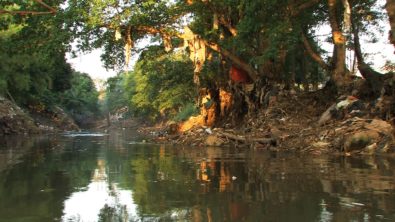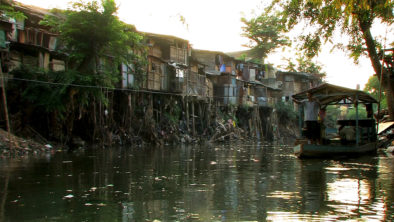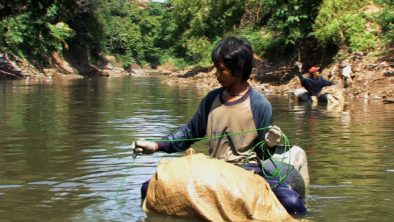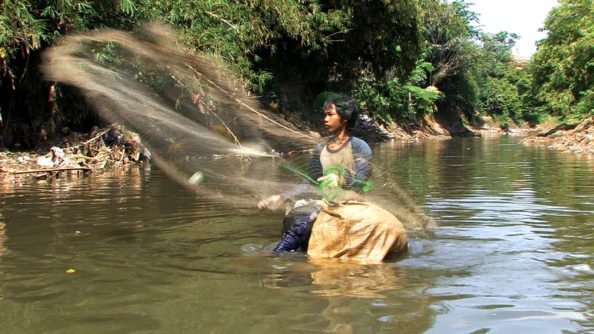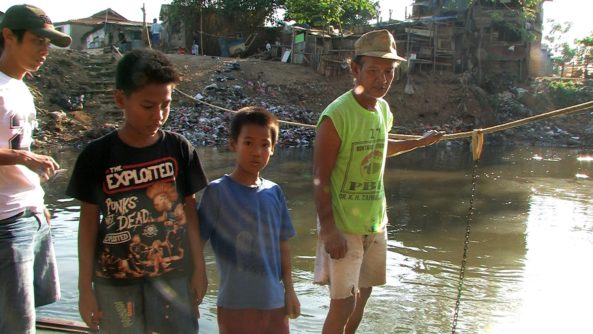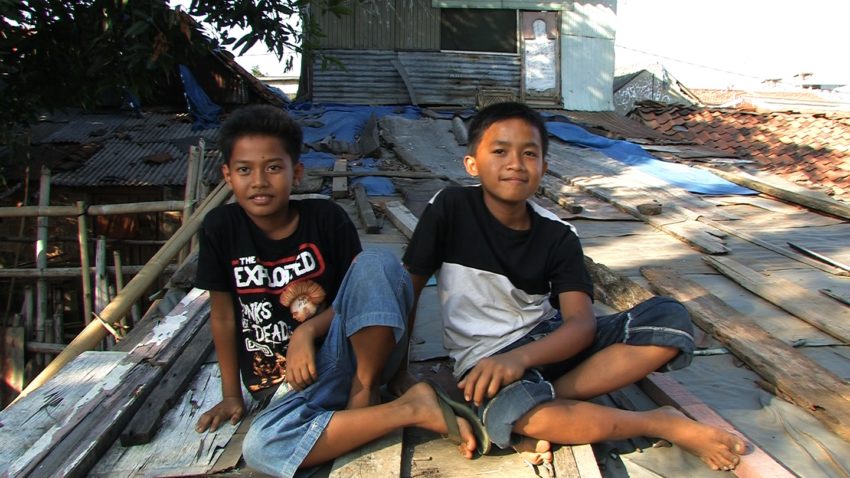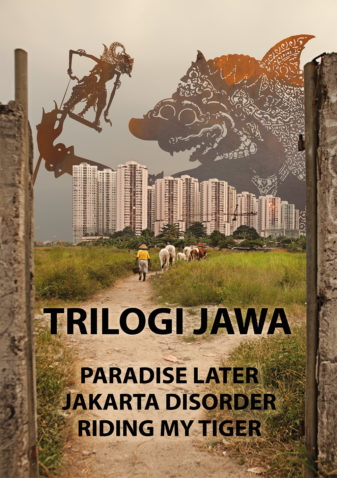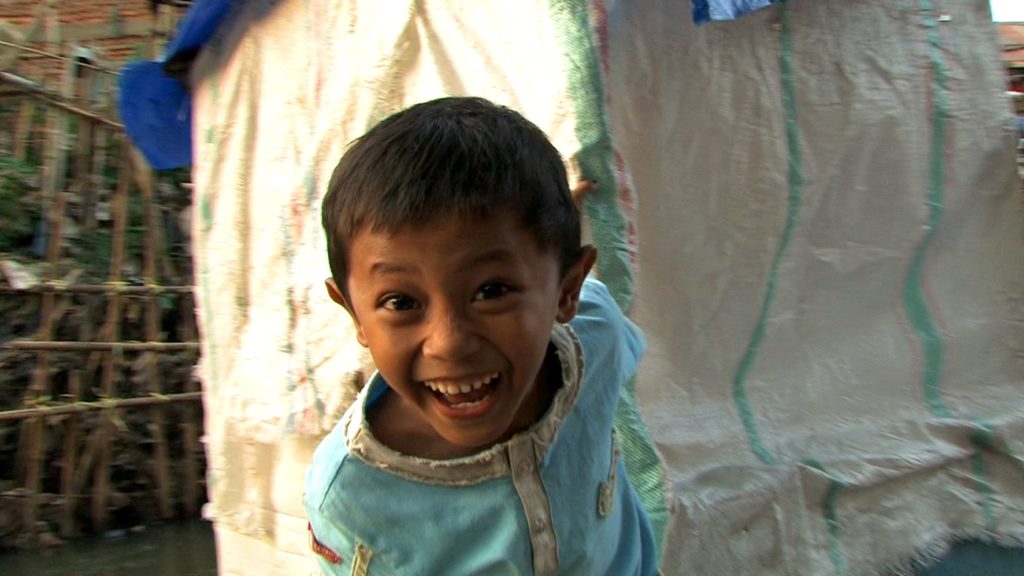
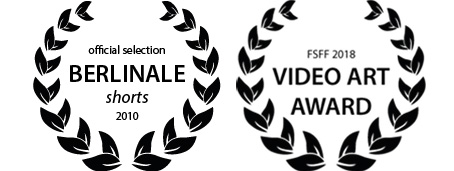
ABOUT
The conquest of the earth is not a pretty thing when you look into it too much. We grab what we can get for the sake of what is to be got. – JOSEPH CONRAD, “Heart of Darkness”, 1899)
Inside the head of a trader we travel on a river meandering through an apocalyptic scenery. A stream of thoughts carries us away into a vortex of accusation, damnation and self-condemnation. We take a short exit – into a reality. The gaze widens for a moment. But our captain frantically navigates us towards a fatal ending.
Paradise Later is the first part of Ascan Breuer’s Trilogi Jawa.
„One of the best contributions of the 2010 short-film-program by German Films in Cannes.” – FILM DIENST
„It’s visually striking, haunting, compelling. Paradise Later is impressive, beautifully synthesising documentary footage and the cornerstone of Congolese colonial comparisons. It lacks the awe-inspiring weight of Apocalypse Now Redux, but is no less strong for coasting on excerpts, snippets, representative samples. Sometimes the sense of a thing is enough, and Paradise Later delivers ably. What it has to say about what has changed and has not changed is worthwhile, if bleak.” – Andrew Robertson, EYE FOR FILM
“When watching Paradise Later one needs a break for reflexion. The messages bore into the mind like a vise. The narrator, a trade agent, welcomes you on board as ‚Dear Society Members’. The fellow passengers are roped into a vortex of thoughts raved by a captive of the economic system. What will he report to the executive board of his company, when he returns from this nowhere? The logocentric view of the narrator comprehending and classifying everything without admitting any dialogue superimposes the takes with noticeable arrogance. The atmosphere – appearing unreal because of the soundtrack – is briefly disrupted, as if the ‚real’ sounds and voices of the environment were trying to fight back against the omnipotence of the voice-over. Ascan Breuer contextualizes passages of Joseph Conrad’s novel Heart of Darkness with documentary pictures. He uses this more than 100 year old text with some modifications as a contemporary comment. It’s not a dream in which the spectator plunks, but apathy that overlays the narrator’s grief. Are we all in the same boat already?” – Ute Mörtl, MALMOE
“Paradise Later vividly recreated the sense of Conrad’s novella far more effectively than Coppola’s overblown adaptation Apocalypse Now.” – TALKING PICTURES
Paradise Later – Trilogi Jawa I
Stream & Download | Distribution | Trilogi Jawa
Insights
TEXT
Annual report (111)
attn. Executive Board
Dear Society Members,
You know I hate and detest,
and can’t bear a lie
– not because I am straighter than the rest of us,
but simply because
it appals me.There is a taint of death,
a flavour of mortality in lies.
It makes me miserable and sick,
like biting something rotten would do.I have a voice,
and for good or evil
mine is the speech that cannot be silenced.Of course, a fool,
what with sheer fright
and fine sentiments,
is always safe.But within me
a battle is raging
for the possession of my soul.I have realized:
it is a soul satiated with primitive emotions,
avid of lying fame,
of sham distinction,
of all the appearances of success and power.Sometimes I’m contemptibly childish.
I desire to have heads of state
welcome me in the lobbies of Davos
on my return from this ghastly Nowhere,
where I once intended
to accomplish great things.Until now
I believed
that if I showed you
I have in me
something
that is really profitable,
then there will be no limits to the recognition of my ability.Of course
I must take care of the right motives.
Right motives – always.You want a deliberate belief.
An appeal to me out here
– and for you,
in the headquarters of the world order.For you I am one of the Workers.
But at the same time something like an emissary of light,
something like a lower sort of apostle.You know, there is a lot of such rot
let loose in the upper floors…The conquest of the earth is not a pretty thing when you look into it too much.
What saves us is efficience
– the devotion to efficiency.
What redeems it is the idea only.
An idea at the back of it;
not a sentimental pretence but an idea;
and an unselfish belief in the idea
– something you can set up, and bow down before,
and offer a sacrifice to…We are the forerunners of change,
of conquest,
of trade,
of massacres,
of blessings.
…this choice of nightmares
forced upon this land
invaded by these mean and greedy phantoms,
of which I am one.Our administration is merely a squeeze, and nothing more.
We are conquerors,
and for that you want only brute force
– nothing to boast of, when you have it,
since your strength
is just an accident
arising from the weakness of others.We grab what we can get
for the sake of what is to be got.It is just robbery with violence,
aggravated murder
on a great scale,
and we going at it blind,
as is very proper for those who tackle a darkness– reckless without hardihood,
greedy without audacity,
and cruel without courage;there is not an atom of foresight
or of serious intention,
and we don’t seem aware these things are wanted
for the work of the world.
To tear treasure out of the bowels of the land is our desire,
with no more moral purpose at the back of it
than there is in burglars
breaking into a safe.The earth seems unearthly.
We are accustomed to look upon the shackled form of a conquered monster, but here
– here I can look at a thing
monstrous and free.Things have taken on a life of their own.
Do you see the story?
Do you see anything?
It seems to me I am trying to tell you a dream.I wonder whether the stillness on the face of the immensity looking at us
is meant as an appeal
or a menace.What are we who has strayed in here?
Can we handle that dumb thing?
Or is it already handling us?
I feel how big,
how confoundedly big, is that thing
that can’t talk,
and perhaps is deaf as well.Every extreme grief may ultimately vent itself in violence
– but more generally takes the form of apathy.Knowing this, we believe ourselves safe.
Fear is on our side
restraining it.But there is a grief we can not appease.
No fear can stand up to hunger,
no patience can wear it out,
disgust simply does not exist where hunger is;
and as to superstition,
beliefs,
and what you may call principles,
they are less than chaff in a breeze.Don’t you know the devilry of lingering starvation,
its exasperating torment,
its black thoughts,
its sombre and brooding ferocity?
It takes all your inborn strength to fight hunger properly.
It’s really easier to face bereavement,
dishonour,
and the perdition of one’s soul.Sad, but true. These people, too,
have no earthly reason for any kind of scruple.
But this is the fact facing me
– dazzling and irritating.But trust my words:
They will come!
They will come after us.Why aren’t you coming after us?
Lyrics by Joseph Conrad, taken from the novel Heart of Darkness (1899)
Remixed & mashed up by Ascan Breuer (2010)
Team
A film by Ascan Breuer & Victor Jaschke
Concept/Montage: Ascan Breuer
Camera: Victor Jaschke
Sound/Music: Sven Töllner
Speaker: Tony Dunham (englisch), Martin Aleida (indonesisch), Ascan Breuer (deutsch)
Translations: Martin Aleida (ind.), Ascan Breuer (ger)
Production: Ascan Breuer, Victor Jaschke

